15 start with P start with P
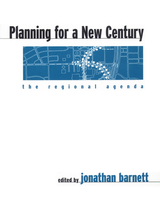
Across the United States, issues such as sustainability, smart growth, and livable communities are making headlines. Planning for a New Century brings together leading thinkers in the fields of planning, urban design, education, welfare, and housing to examine those issues and to consider the ways in which public policies have helped create—and can help solve—many of the problems facing our communities.
Each chapter identifies issues, provides background, and offers specific policy suggestions for federal, state, and local initiatives. Topics examined include:
- the relation of existing growth management policies to social equity, as well as how regional growth management measures can make new development more sustainable
- how an obscure technical procedure in highway design becomes a de facto regional plan
- ways in which local governments can promote environmental preservation and better-designed communities by rewriting local zoning and subdivision ordinances
- why alleviating housing shortages and slum conditions has resulted in a lack of affordable housing, and how that problem can be solved
- how business improvement districts can make downtowns cleaner, safer, and more welcoming to workers and visitors
In addition, the book features chapters on public safety, education, and welfare reform that include proposals that will help make regional growth management easier as inner-city crime is reduced, schools are improved, and concentrations of extreme poverty are eliminated.
Planning for the New Century brings together current academic research with pressing public policy concerns, and will be a useful resource for policymakers at all levels of government, for planners and architects, and for students and scholars of urban planning and design, and urban studies.

This well-written volume explores the relationships between politics and welfare programs for low-income residents in Birmingham during four periods in the twentieth century:
From the time of its founding in 1871, Birmingham has had a biracial population, so the theme of race relations runs naturally throughout the narrative. LaMonte pays particular attention to those efforts to achieve a more harmonious biracial community, including the failed effort to establish an Urban League in the 1940s, the progressive activities of the Community Chest’s Interracial Division in the 1950s, which were abruptly terminated, and the dramatic events of the Civil Rights Movement in the 1960s, when local events were elevated to international significance.

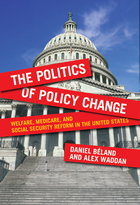
For generations, debating the expansion or contraction of the American welfare state has produced some of the nation's most heated legislative battles. Attempting social policy reform is both risky and complicated, especially when it involves dealing with powerful vested interests, sharp ideological disagreements, and a nervous public.
The Politics of Policy Change compares and contrasts recent developments in three major federal policy areas in the United States: welfare, Medicare, and Social Security. Daniel Béland and Alex Waddan argue that we should pay close attention to the role of ideas when explaining the motivations for, and obstacles to, policy change.
This insightful book concentrates on three cases of social policy reform (or attempted reform) that took place during the presidencies of Bill Clinton and George W. Bush. Béland and Waddan further employ their framework to help explain the meaning of the 2010 health insurance reform and other developments that have taken place during the Obama presidency. The result is a book that will improve our understanding of the politics of policy change in contemporary federal politics.

How much and in which direction have the welfare states among the Western democracies changed over the past decades? Moreover, under what conditions have governments enacted these changes? Based on insights from prospect theory, Barbara Vis demonstrates how socioeconomic or political setbacks affect a government’s view of risk—and thereby the degree and type of reform they pursue. This study’s new theoretical stance and innovative methodological approach make it a must read for those policymakers, scholars, and students interested in the politics of welfare state reform.

Between the Civil War and World War II, Catholic charities evolved from volunteer and local origins into a centralized and professionally trained workforce that played a prominent role in the development of American welfare. Dorothy Brown and Elizabeth McKeown document the extraordinary efforts of Catholic volunteers to care for Catholic families and resist Protestant and state intrusions at the local level, and they show how these initiatives provided the foundation for the development of the largest private system of social provision in the United States.
It is a story tightly interwoven with local, national, and religious politics that began with the steady influx of poor Catholic immigrants into urban centers. Supported by lay organizations and by sympathetic supporters in city and state politics, religious women operated foundling homes, orphanages, protectories, reformatories, and foster care programs for the children of the Catholic poor in New York City and in urban centers around the country.
When pressure from reform campaigns challenged Catholic child care practices in the first decades of the twentieth century, Catholic charities underwent a significant transformation, coming under central diocesan control and growing increasingly reliant on the services of professional social workers. And as the Depression brought nationwide poverty and an overwhelming need for public solutions, Catholic charities faced a staggering challenge to their traditional claim to stewardship of the poor. In their compelling account, Brown and McKeown add an important dimension to our understanding of the transition from private to state social welfare.
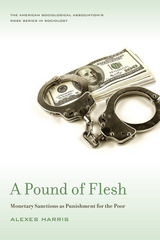
Over seven million Americans are either incarcerated, on probation, or on parole, with their criminal records often following them for life and affecting access to higher education, jobs, and housing. Court-ordered monetary sanctions that compel criminal defendants to pay fines, fees, surcharges, and restitution further inhibit their ability to reenter society. In A Pound of Flesh, sociologist Alexes Harris analyzes the rise of monetary sanctions in the criminal justice system and shows how they permanently penalize and marginalize the poor. She exposes the damaging effects of a little-understood component of criminal sentencing and shows how it further perpetuates racial and economic inequality.
Harris draws from extensive sentencing data, legal documents, observations of court hearings, and interviews with defendants, judges, prosecutors, and other court officials. She documents how low-income defendants are affected by monetary sanctions, which include fees for public defenders and a variety of processing charges. Until these debts are paid in full, individuals remain under judicial supervision, subject to court summons, warrants, and jail stays. As a result of interest and surcharges that accumulate on unpaid financial penalties, these monetary sanctions often become insurmountable legal debts which many offenders carry for the remainder of their lives. Harris finds that such fiscal sentences, which are imposed disproportionately on low-income minorities, help create a permanent economic underclass and deepen social stratification.
A Pound of Flesh delves into the court practices of five counties in Washington State to illustrate the ways in which subjective sentencing shapes the practice of monetary sanctions. Judges and court clerks hold a considerable degree of discretion in the sentencing and monitoring of monetary sanctions and rely on individual values—such as personal responsibility, meritocracy, and paternalism—to determine how much and when offenders should pay. Harris shows that monetary sanctions are imposed at different rates across jurisdictions, with little or no state government oversight. Local officials’ reliance on their own values and beliefs can also push offenders further into debt—for example, when judges charge defendants who lack the means to pay their fines with contempt of court and penalize them with additional fines or jail time.
A Pound of Flesh provides a timely examination of how monetary sanctions permanently bind poor offenders to the judicial system. Harris concludes that in letting monetary sanctions go unchecked, we have created a two-tiered legal system that imposes additional burdens on already-marginalized groups.

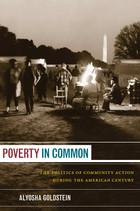
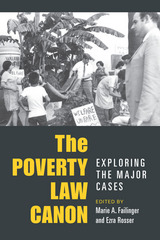
Noted legal scholars explain the legal precedent created by each case and set the case within its historical and political context in a way that will assist students and advocates in poverty-related disciplines in their understanding of the implications of these cases for contemporary public policy decisions in poverty programs. Whether the focus is on the clients, on the lawyers, or on the justices, the stories in The Poverty Law Canon illuminate the central legal themes in federal poverty law of the late 20th century and the role that racial and economic stereotyping plays in shaping American law.
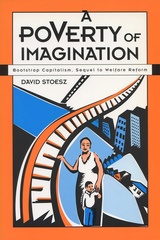
Welfare reform was supposed to end welfare as we know it. And it has. The welfare poor have been largely transformed into the working poor, but their poverty persists. This hard-hitting book takes a close look at where we’ve gone wrong—and where we might go next if we truly want to improve the lot of America’s underclass.
Tracing the roots of recent reforms to the early days of the war on poverty, A Poverty of Imagination describes a social welfare system grown increasingly inept, corrupt, and susceptible to conservative redesign. Investigating the causes of the ongoing failure of welfare assistance, Stoesz focuses on the economic barriers that impede movement out of poverty into the American mainstream. He explores such issues as the heterogeneity of welfare families, generational welfare, inadequate benefits, the negative effects of time limits on welfare recipients, a fringe banking industry that exploits low-income families, the limited capacity of low-wage markets, and the unavailability of credit.
Stoesz suggests that a form of "bootstrap capitalism" would allow individuals and families to participate more fully in American society and achieve upward economic mobility and stability. This proposal, emphasizing wage supplements, asset building, and community capitalism, sets the stage for the next act in poverty policy in the United States. With its valuable insights on the American welfare system and its positive agenda for change, this book makes a significant intervention in our ongoing struggle to come to terms with widespread poverty in the wealthiest nation on earth.
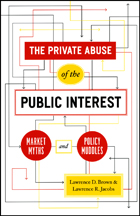
The authors support their pragmatic approach with evidence drawn from in-depth analyses of education, transportation, and health care policies. In each policy area, initiatives such as school choice, deregulation of airlines and other carriers, and the promotion of managed care have introduced or enlarged the role of market forces with the aim of eliminating bureaucratic inefficiency. But in each case, the authors show, reality proved to be much more complex than market models predicted. This complexity has resulted in a political cycle—strikingly consistent across policy spheres—that culminates in public interventions to sustain markets while protecting citizens from their undesirable effects. Situating these case studies in the context of more than two hundred years of debate about the role of markets in society, Brown and Jacobs call for a renewed focus on public-private partnerships that recognize and respect each sector’s vital—and fundamentally complementary—role.

What is the right social policy for the future? Sar A. Levitan and Robert Taggart have written a book that dispassionately examines recent social programs. They respond to the fashionable arguments that question the results of government intervention and the need to correct social and economic ills. They weigh the charges that new programs have been wasteful, ineffective, and even counterproductive. The authors disprove the notion that recent social programs have failed, that recipients of aid have been hurt more than helped, or that the means and the ends of the last decade’s social policies were misconceived.
They base their conclusions upon data gathered by a host of governmental agencies as well as by other scholarly studies. Among their major findings:
— The expansion of welfare will not continue indefinitely since most of those in need have been reached. In a healthy economy welfare costs will stabilize. In spite of its shortcomings, welfare has resulted in a more equitable, comprehensive system of income protection.
— Medicare and Medicaid have not contributed to a national “health crisis” but have delivered health care to millions who might otherwise have been unable to afford it.
— Housing assistance has been unfairly condemned. While changes are warranted the concepts are sound and the benefits undeniable.
— Federal programs for vocational training, job placement, remedial education, and other services have a high payoff for the individuals involved and for society as a whole.
— Federal efforts have been instrumental in the substantial progress made by minorities.
Levitan and Taggart consistently document effective, positive achievements by government to promote the general welfare and to redress many of the nation’s most serious social and economic ills stemming from poverty, discrimination, and old age. They argue that an affluent and compassionate society has the ability and responsibility to extend rather than to retrench its basic system of protection for those who cannot make it on their own. If progress toward a just society is to continue, the new agenda must begin with a judicious and comprehensive reappraisal of last decade’s reforms. The Promise of Greatness provides such a perspective. Based upon a sound analysis of past legislation, it will certainly be an indispensable guide to the future policies that shape this country.
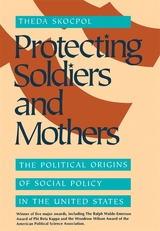
It is a commonplace that the United States lagged behind the countries of Western Europe in developing modern social policies. But, as Theda Skocpol shows in this startlingly new historical analysis, the United States actually pioneered generous social spending for many of its elderly, disabled, and dependent citizens. During the late nineteenth century, competitive party politics in American democracy led to the rapid expansion of benefits for Union Civil War veterans and their families.
Some Americans hoped to expand veterans' benefits into pensions for all of the needy elderly and social insurance for workingmen and their families. But such hopes went against the logic of political reform in the Progressive Era. Generous social spending faded along with the Civil War generation.
Instead, the nation nearly became a unique maternalist welfare state as the federal government and more than forty states enacted social spending, labor regulations, and health education programs to assist American mothers and children. Remarkably, as Skocpol shows, many of these policies were enacted even before American women were granted the right to vote. Banned from electoral politics, they turned their energies to creating huge, nation-spanning federations of local women's clubs, which collaborated with reform-minded professional women to spur legislative action across the country.
Blending original historical research with political analysis, Skocpol shows how governmental institutions, electoral rules, political parties, and earlier public policies combined to determine both the opportunities and the limits within which social policies were devised and changed by reformers and politically active social groups over the course of the late nineteenth and early twentieth centuries.
By examining afresh the institutional, cultural, and organizational forces that have shaped U.S. social policies in the past, Protecting Soldiers and Mothers challenges us to think in new ways about what might be possible in the American future.
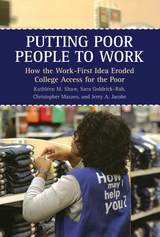
READERS
Browse our collection.
PUBLISHERS
See BiblioVault's publisher services.
STUDENT SERVICES
Files for college accessibility offices.
UChicago Accessibility Resources
home | accessibility | search | about | contact us
BiblioVault ® 2001 - 2024
The University of Chicago Press









